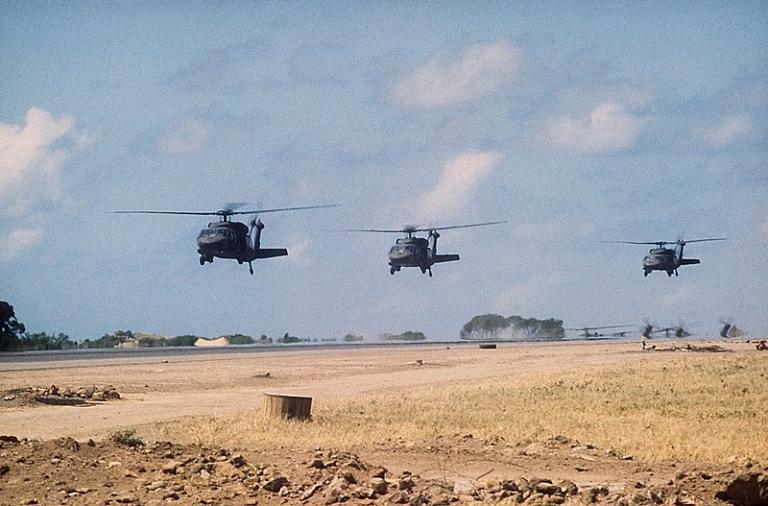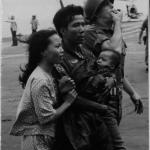Recently, I was one of several historians of the 1970s-1980s era interviewed by New York Times journalist Clay Risen. The article’s subtitle reads “The fall of Kabul is not the fall of Saigon. But historians still point to some useful parallels and lessons.” So how did Vietnam affect US politics and culture over the following decade or two, and are there analogies for Afghanistan? Here are some additional thoughts on that currently pressing, and tragic, topic.
When we think of the fall of Saigon in April 1975, the images that obviously come to mind are the last Americans fleeing the U.S. embassy and of helicopters being pushed off the decks of aircraft carriers. It is a small part of the story, but let me focus on those helicopters. That symbolic imagery ran through the next decade or two as an overwhelming metaphor for US weakness and (it was often framed this way) almost a loss of national virility. One obvious example was Desert One in 1980, which marked the failure of the US mission to rescue US hostages in Tehran. The helicopters of Desert One drove a definitive nail into Jimmy Carter’s hopes of re-election. Again, they symbolized American defeat and incompetence better than any detailed analysis. Reagan’s unspoken message in 1980 was that we are not going back to wrecked helicopters. In the 1980s, the administration carefully showed US helicopters and aircraft fighting and winning, as in Grenada.
Then there was however an alarming reprise of the old nightmare in 1993, with another failure in the US mission to Mogadishu – think Black Hawk Down, and again, with downed helicopters. It all contributed to the vision of Bill Clinton as a neo-Carter.
Yet another US failure, this time in Kabul, puts immense pressure on any future US president to avoid any such humiliation, and encourages projecting a brawny and non-compromising international image. Such raising of the diplomatic macho stakes could be bad news.
Another focus of that Vietnam failure was the MIA issue, which pervaded US popular culture through the 1980s (think Rambo, among many others). Anti-government conspiracy theories had flourished from the late 1960s and reached amazing heights in the mid-late 1970s with all the assassination theories. What the Vietnam/MIA story did was to take those ideas and transform them definitively into anti-government and anti-liberal directions.
Saigon 1975 sent a larger lesson about the triumph of “Third World” peoples, imagined according to quite demeaning stereotypes – if those “peasants in pajamas” could defeat our high technology, something had gone very badly wrong. (North Vietnam was actually a very tough opponent, but let that pass). Osama bin Laden was deeply inspired by the vision of the US defeat in Mogadishu.
Today, you can definitely expect various US enemies at state and national level to note the failure in Afghanistan, and use it as a lesson for other regions in the near future. China has already mocked Taiwan for leaning on such an utterly unreliable ally as the US, who can be guaranteed to let them down. The Chinese may well be correct.
Saigon 1975, Kabul 2021…. The resemblances are too obvious, but so are the differences. Vietnam was different, partly because it was a novel US defeat, not something that people were used to back then. American observers this time have almost cone to expect that something like this will happen. I hate to write that sentence. The script we see now in Kabul, to that extent, is familiar because it is pre-written. I recall cartoons around 2006 or so imagining a Saigon-style collapse in Baghdad (pre-surge), with the last Americans fleeing the embassy via helicopter.
Also, the character of the wars is utterly different. Vietnam was a mass war for Americans, fought with hundreds of thousands of (mainly) draftees. The US armed forces this time are utterly different, much more professional and of course all volunteer. How many Americans personally know someone who has fought in Afghanistan? This is all very, very, different from the Vietnam years. Briefly, we have and had far less invested, in that way.
In political terms, Joe Biden will probably ride out this crisis, without necessarily facing a “Who Lost Kabul?” inquisition. But all bets are off if Islamist terrorism revives in the US, or against US targets overseas. If Biden’s “softness” can be seen as contributing to such actions, the Kabul memory could be very dangerous indeed politically. To me, it is inconceivable that the Kabul collapse will not cause a significant revival of Islamist activism around the world – in Mozambique, in West Africa….
The somewhat good news in all this is that Islamist forces in Western countries are under such tight surveillance and infiltration that they have not been able to do much in recent years, in stark contrast to the situation around 2001. The networks are basically smashed, as is what we might call the whole C3 system of command, control and communications. That has left some people with the blissful delusion that suddenly the “real danger” is white supremacist activism, so they can pretend the Islamists have just gone away, or gee, maybe they were never there at all. We may well be finding out shortly just how wrong that view is.
It’s morning again for al-Qaeda.
On The Myth of the Graveyard of Empires
To conclude with a brief rant about a bugbear of mine. This is the refrain that Afghanistan is a “graveyard of empires,” which can infallibly resist any opponent or occupier. This is plain wrong. Through its history, the territory has repeatedly been grabbed by various empires, which have duly fallen as time went on, but not because of the plucky Afghans. If you try and find Afghanistan on historical maps from various eras, you will have a very tough time because in most centuries, it was nothing like a united territory, as so many of its regions were incorporated into multiple other empires, usually several at any given time. The Mongols incorporated it into their empire, followed by Timur and his successors. I quote Wikipedia: “Between the 16th and 18th century, the Uzbek Khanate of Bukhara, Iranian Safavids, and Indian Mughals ruled parts of the territory.” I can go back further if you’d like? Who said Graveyard?
The British suffered some disasters in the area, spectacularly in 1842. In modern times, though, the British more than once slapped down Afghan leaders or regimes when they became troublesome, and crossed various imperial red lines. The British won a decisive victory in a 1919 war, which kept the Afghans good, or at least subdued, for some decades.
Deterrence really did and does work. If the US had followed such a hit-hard-and-leave policy in 2001-2002, without trying to set up shop for the long term, we would probably regard the Afghanistan incursion as a triumph of the country’s foreign policy, and a brilliant response to 9/11. The Israelis, to take an obvious example, would certainly have pursued such a strategy if they had been attacked thus, and would not have wasted time and resources on trying to occupy the territory, still less to turn it into a Western democracy. The Taliban, for their part, have always been more flexible than outsiders may think. To give them full credit, factions within the pre-9/11 Taliban regime would have been more than happy to sell bin Laden to the US, had the Clinton administration shown any willingness to take up their offer. If the long term failure in Afghanistan teaches any lesson, it is not about interventionism as such, but about the lunacy of nation-building.
Significantly, the Afghans were most successful historically not by defeating empires, but by balancing competing imperial interests. A hundred years ago, that meant the British and the Russians. In the 1980s, it was the Soviets and the US. In the present century, it has been the US versus – good grief – Pakistan. I am sure the Chinese are reading this playbook carefully right now.
Anyway, can we have a moratorium on “Graveyard of Empires”?














